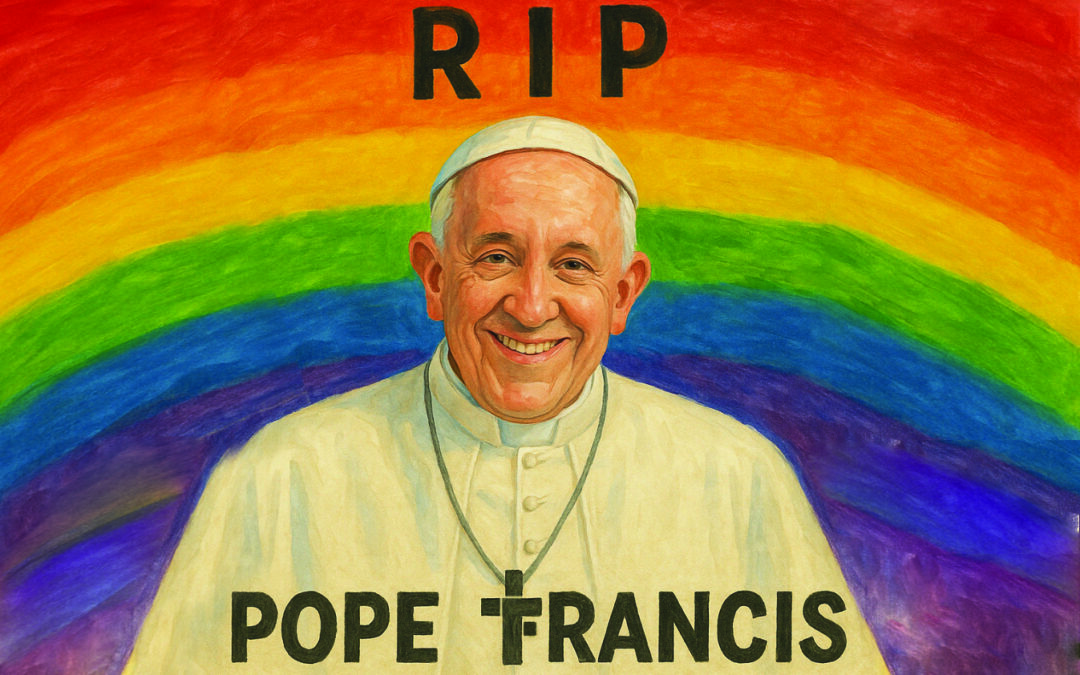Today, our hearts are heavy.
As the Global Network of Rainbow Catholics, we join millions around the world in mourning the death of Pope Francis. For us, this loss is deeply personal. His papacy marked a turning point—often imperfect, sometimes painful, but undeniably real. It marked the beginning of a relationship between the Church and the LGBTIQ+ faithful that no longer denied, dismissed, or feared our presence. It was a papacy where, for the first time, we saw ourselves reflected in the words of the Church’s highest authority—not as a threat, not as a problem, but as fellow pilgrims of faith.
We remember the moments that changed us.
The first time he said “Who am I to judge?”
The first time he used our names.
The first time he met with us, listened to our stories, embraced us.
The first time the Vatican said we could be blessed.
The first time he looked into our eyes and saw not ideology, but humanity.
These were not abstract gestures. They were doors. And we walked through them. Some of us walked through them weeping. Some holding the hands of our children. Some unsure if the door would close again. But we walked through, together.
“Our dear pope opened up new paths for LGBT people and for all marginalised people in general,” said our Co-Chair Christopher Vella. “God gifted us with his papacy. May he now rest in peace.”
Pope Francis changed the conversation. Under his leadership, LGBTIQ+ people were no longer merely spoken about—they were spoken to, listened to, and sometimes, embraced with great tenderness. He invited our voices, and met personally with GNRC leaders, including members of our Board, in gestures that carried both symbolic and pastoral significance. In those meetings, we brought our testimonies, our families, our wounds, and our hope. We spoke from our hearts. And he met us with dignity. We left with tears and stories we would carry forever.
For many of us, one moment stood out: the blessing of same-sex couples. While some tried to restrict or reinterpret it, the direction had changed. Baptism was made available again to the children of same-sex couples. Gay and lesbian godparents were no longer to be automatically rejected. Priests received permission to bless the unions of couples who had long felt unseen. These actions did not fully resolve our theological and pastoral concerns, but they shifted reality. They cracked the wall. And the light that poured in could not be forgotten.
Marianne Duddy-Burke, our Co-Chair, shared this:
“Francis’ papacy has been ground-breaking for LGBTIQ+ people. His willingness to speak about and with us moved our concerns into the Catholic mainstream… Pope Francis was the first to call for an end to the criminalization of homosexuality. He allowed blessings for same-sex couples. He gave space to our voices in the Synod. We are part of the record now. That alone changed everything.”
We were no longer invisible. From the periphery, he drew us to the center.
His health had been a concern for years. Each hospitalization, each surgery, each slow public appearance brought new waves of prayer. We prayed for his strength, even as we feared the moment we now face. And still, he kept working. Through fatigue and illness, he continued to meet people, to speak of mercy, to seek justice in quiet but deliberate ways. Even as his mobility diminished, his resolve seemed to grow. His final years were marked by fewer travels, but deeper listening. Even his silences held meaning. In his final months, we watched him slow down. We saw the exhaustion in his eyes. But we also saw peace.
We also know his legacy is not without contradictions. His love was immense, but the statements about transgender individuals in Dignitas Infinita caused great sorrow in our community. These wounds are still open. The hurt is real. He did not change official doctrine, and discrimination still finds shelter there. The Catechism still speaks in terms of disorder. The legal structures of the Church still restrict the sacraments in ways that break hearts. Yet something had begun—a new tone, a new space, a new possibility. It is up to us now to ensure it continues.
And even in front of those contraddictions, we must also speak truthfully about the signs of hope. Pope Francis met regularly with transgender individuals. He welcomed them at the Vatican, listened to their stories, and showed personal compassion. These encounters, quiet, often undocumented, yet deeply meaningful, show that his heart remained open even when his words did not always follow. His actions, in this case, spoke louder. These gestures cannot be deleted. They belong to history, and to the lives he touched.
We recall how Pope Francis welcomed groups of transgender women—many of them migrants or sex workers—from the outskirts of Rome and other parts of Italy into his presence, again and again. In 2020, in the midst of the COVID-19 pandemic, he offered them direct support through the parish of Torvaianica, and later met them at the Vatican. He did not do this once. He did it regularly. In 2023, he welcomed a group of trans people hosted by the ‘Casa di Andrea’ shelter into his Apostolic Palace, listened to them speak about their lives, and posed for photos with them with warmth. One of the women present said, “He opened his arms to us without asking who we were. He hugged us like a father.” These encounters—quiet, often undocumented, yet deeply meaningful—show that his heart remained open even when his words did not always follow. His actions, in this case, spoke louder. These gestures cannot be deleted. They belong to history, and to the lives he touched.
“We will carry those changes with us,” we said before. But now we must add: we will protect them. Because what he set in motion cannot be fully undone. It is not only in policies and speeches. It is in the memory of being called by name. In the courage to speak in our own voice. In the communities that dared to hope again. In the families that returned to church. In the parents who wrote letters to their bishops. In the young queer Catholics who felt, for the first time, that the Gospel might also be theirs.
And we carry memories—deeply human ones.
“My most joyous moment was to hug the Pope,” said Ruby Almeida, our media coordinator. “The saddest is to know that the beautiful mood music of Pope Francis has died. My heart is truly broken.”
Pope Francis showed us love. Not always perfectly, not always fully. But he showed it. He chose it. And he did so with kindness and clarity in moments that history will remember. He spoke often of a Church that must be like a field hospital—present where the wounds are deepest. For many of us, we were those wounds. And in many ways, he chose to be there with us.
We mourn today.
We remember.
We give thanks.
And we promise to keep walking through every door he dared to open. We will make sure those doors stay open for others. We will carry forward his call for a more merciful, listening, and humble Church. We will do so in his memory, but not only in memory—in mission.
May he now rest in heaven, where mercy is full and justice complete. May the peace he preached be now his. May the embrace he offered us be returned to him by the One he served.


